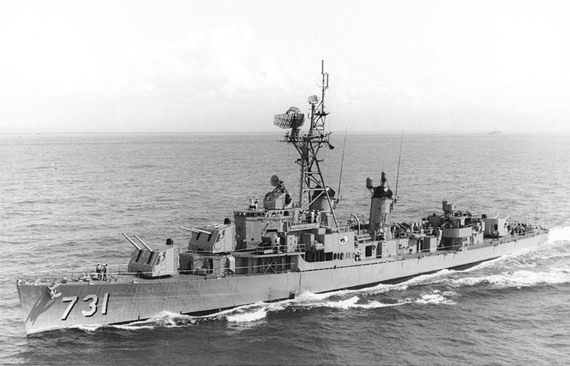The first Tonkin Gulf incident occurred exactly 50 years ago this week, on August 2, 1964. Because the Tonkin Gulf Resolution which it spawned became the legal basis for the Vietnam War, I expected this weekend's papers to be replete with remembrances and lessons we need to learn from the mistakes we made in its aftermath. But I found absolutely nothing in the Wall Street Journal, the New York Times, and my local paper, the San Jose Mercury News -- not even when I did a web search for all of the last week. The Washington Post just mentioned that the incident had occurred, but had no analysis or introspection. Even The Huffington Post appears to have had no coverage, other than my column of Thursday, July 31.

The USS Maddox was attacked fifty years ago today
Given that the war cost 58,000 American lives and somewhere between 1,000,000 and 3,000,000 Vietnamese, and each of its major rationales was later shown to be false, the nation's lack of memory is stunning, and dangerous.
There's no point in repeating what I already said in Thursday's column - please read it if you haven't done so already. Rather, I am taking this opportunity to point you to a related sequence of 10 posts I wrote last year on Avoiding Needless Wars, and ask that you consider the lessons we can learn from that history before we stumble into yet another needless war with Iran, North Korea, Syria, or even worse, with Russia:
Part 1, The First Gulf of Tonkin Incident: Although Pres. Johnson told us that this attack by North Vietnam was unprovoked aggression on the high seas, the very next day he told a friend, "there have been some covert operations in that area that we have been carrying on - blowing up some bridges and things of that kind, roads, and so forth. So I imagine they [North Vietnam] wanted to put a stop to it."
Part 2, The Second Gulf of Tonkin Incident: LBJ portrayed this attack as the straw that broke the American camel's back, but formerly classified information proves that it never happened. It was a figment of our imagination, but one which admirably fit Johnson's need to appear temperate while taking intemperate action to appear decisive and strong - qualities his Republican opponents had said he lacked, and were using against him in the upcoming presidential election that November.
Part 3, Are We About to Repeat the Mistakes of Vietnam?: When I wrote this piece on March 18, 2013, Senate Resolution S.65 had 66 sponsors and cosponsors. I referred to it as "a kind of Iran War Gulf of Tonkin Resolution" because it concludes:
if the Government of Israel is compelled to take military action in legitimate self-defense against Iran's nuclear weapons program, the United States Government should stand with Israel and provide ... diplomatic, military, and economic support to the Government of Israel in its defense of its territory, people, and existence.
As the Tonkin Gulf incidents show, what might be seen as acts of "legitimate self-defense" can later turn out to be figments of our imagination or outright lies. Disturbingly, it later passed the Senate 99-0, and the above wording is repeated in the "Kirk-Menendez Bill," which Iran hawks still hope to pass.
Part 4, Nixon's Madman Nuclear Alert: In an attempt to end the Vietnam War, Pres. Nixon told his chief of staff, H. R. Haldeman, "I call it the Madman Theory, Bob. I want the North Vietnamese to believe that I've reached the point that I might do anything to stop the war. We'll just slip the word to them that 'for God's sake, you know Nixon is obsessed about Communism. We can't restrain him when he is angry -- and he has his hand on the nuclear button' -- and Ho Chi Minh himself will be in Paris in two days begging for peace."
Part 5, Operation Northwoods: In March 1962, seven months before the Cuban Missile Crisis, the Joint Chiefs of Staff unanimously recommended "pretexts which would provide justification for US military intervention in Cuba." One of their suggestions was that "A 'Remember the Maine' incident could be arranged ... We could blow up a US ship in Guantanamo Bay and blame Cuba."
Part 6, North Korea was written in April 2013, when North Korea was making wild threats that it might attack the US with nuclear weapons. This piece presents three hypotheses which run counter to the conventional wisdom that this is just more crazy behavior from a "nut job nation." My analysis is still relevant because the stimulus which produced North Korea's outbursts is about to be repeated.
Part 7, Afghanistan suggests that we could have avoided our current war in Afghanistan if we had thought things through more carefully in 1979, before creating al Qaeda to battle the Soviets.
Part 8, Syria dissects the arguments being made last August for a US attack on Syria. It was written just before Russia saved us from taking military action - one more reason why improved relations with Russia are essential to our national security.
Part 9, Iraq: Secretary of State Colin Powell's Chief of Staff, Col. Lawrence Wilkerson, decries his participation "in a hoax on the American people" in helping with Powell's infamous "vial of anthrax" UN speech which played a key role in justifying our invasion of Iraq.
Part 10, Iran quotes then Secretary of Defense Robert Gates as saying that military action against Iran's nuclear program would solve nothing. In fact, he claimed it would be more likely to drive Iran to acquire nuclear weapons. The piece then explores what we could do to prevent Iran from going nuclear.